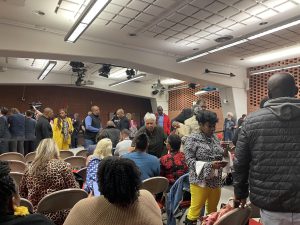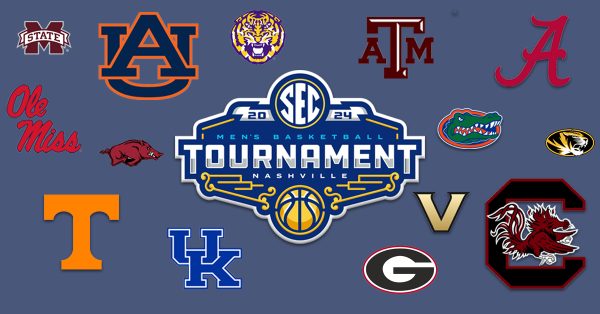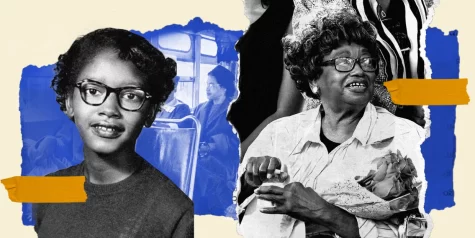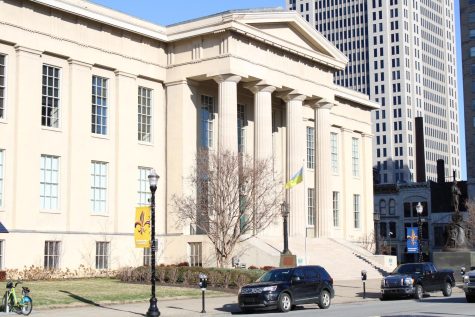“Don’t Say Gay Bill” passes in Florida, worrying LGBTQ+ Manual students
Graphic by KC Ciresi.
March 20, 2022
On Tuesday, March 8, the Florida legislature passed HB 1557: Parental Rights in Education (colloquially known as the “Don’t Say Gay Bill”) and is now awaiting Governor Ron DeSantis’ signature. It’s expected that he will sign it into law. The bill specifically prohibits K-3 classes from discussing any topics related to sexual orientation or gender identity until “developmentally appropriate.” The “Don’t Say Gay Bill” would go into effect July 1, 2022.
The bill specifically mention kindergarten through third grade as the target range in which teachers cannot discuss or instruct lessons on gender identity/sexual orientation; however, critics have argued that the language can encompass beyond these grades. Democrats have argued that the statutes can be applied to any grade level if a parent disagrees with content. What does “age appropriate or developmentally appropriate for students in accordance with state standards” even mean? There is no definitive definition for the definition.
The fear of lawsuits from parents of older children could create a “chilling” effect where teachers avoid the subjects entirely. This would effectively erase LGBTQ+ issues from classrooms.
The bill easily passed both houses in Florida’s Republican-dominated legislature and garnered widespread disdain from both Democrats and LGBTQ+ advocacy groups. Even President Joe Biden calling the bill “hateful.”
There are other similar bills eligible for passage across the nation, including Kansas, Tennessee, Oklahoma and Indiana. In Kansas, a bill that would make the use of books or other materials that “depict homosexuality” in the classroom a Class B misdemeanor.
In Tennessee, a bill that would potentially ban any talk of “LGBTQ lifestyle issues” in the classroom recently came up as well.
Many of these bills center around providing parents the ability to remove their children from receiving education on or being involved in conversations discussing LGBTQ topics, such as gender identity. Such as Indiana House Bill 1040, which would ban teachers from discussing anything regarding “sexual orientation, transgenderism or gender identity.”
The legislature has even wormed its way into extracurricular activities, with an Arizona bill requiring that parental consent be given to allow a student to join a club surrounding sexual orientation or gender identity. This could hinder certain youth from opening up about any struggles they have or prevent them from seeking the community, the comfort or support they need.
The “Don’t Say Gay” bill and its counterparts are seen as part of a larger push by the GOP to pass “culture war” bills that specifically target schools and youth in general. For example, Florida passed its own Anti-Critical Race Theory (CRT) bills, barring, “critical race theory” and the “1619 Project” curricular materials from being taught in the state.
Although Kentucky doesn’t have a “Don’t Say Gay” bill of its own, it has introduced legislation to limit “critical race theory” such as Senate Bill (SB) 138 and House Bills (HB) 14,18 and 487, which have also drawn ire from community members in Kentucky.
Some in the Manual community have reacted with outrage over the proposed Florida bill.
“I really think that the bill is so aptly named. It’s just straight out of “Don’t ask, don’t tell,” the bill that allowed LGBTQ persons to serve in the military upon the basis that they are not open about it. It just exemplifies America’s absolute ignorance on certain matters, even if they are non-issues.” Leah Greenberg (12, HSU), who identifies as bisexual, said.
Greenberg also stated that these bills legislate hate and are unnecessary in a nation that is largely moving forward on LGBTQ+ rights.
“Even though gay marriage is legal, being openly gay is legal, being proud of being gay is legal, these states are making it legal to breed hate and confusion by blocking away any semblance of answers for a kid who doesn’t feel themselves in their body or doesn’t feel themselves fitting in with their friends,” Greenberg said.
“The idea of one’s sexuality becoming illegal to even discuss makes me sick,” Dylan Fox (12, HSU) said, “Loving who you want to love should be what is promoted from the start of all development and if hateful bills like these continue to spread through the United States, the rise of students’ mental health issues will continue to worsen as they lose confidence and comfort in themselves.”
The passing of this bill sparks panic in all students across the nation and many Manual students worry that a similar bill will take over Kentucky’s education system. What is being accomplished by passing these bills? To what benefits are there?


















